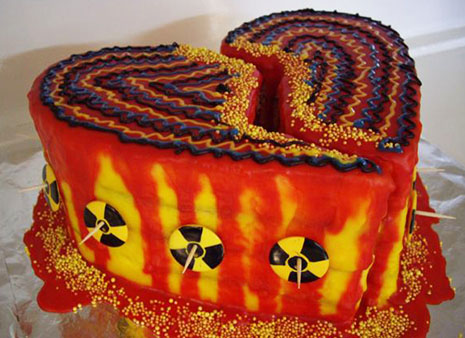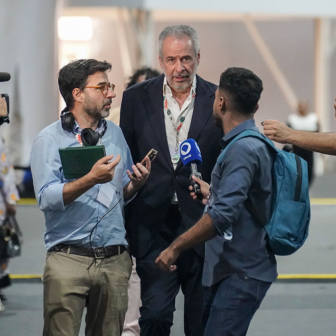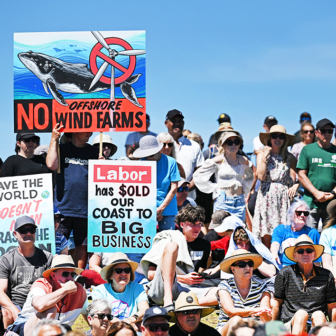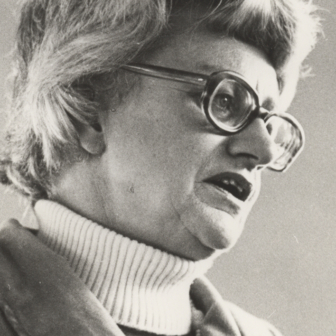THE COMPETITION took a serious turn at this year’s Alice Springs show. A contestant called Angela Pamela submitted entries in almost every prize category – and she cleaned up. Her name was spoken by small groups of families and friends as they passed shelves of crafts, preserves and cakes. “This one’s Angela Pamela, too,” a woman said, pointing to a fruitcake. “I think it’s a uranium thing,” her friend replied.
Angela Pamela has been around these parts since the 1970s, when a German company was drilling holes in the ground. Uranerz estimated that there could be as much as 13,000 tonnes of uranium at the site, twenty-five kilometres south of Alice Springs, but handed the land back to the Northern Territory government when the market turned cold in the early 1980s. The site was named after Pamela, a Uranerz geologist who worked on the project, and Angela, her colleague’s wife.
Now Angela Pamela is back and this time she means business. The Northern Territory government awarded a new exploration licence to two companies, Cameco and Paladin, last October. By May, Cameco was pulling up samples from 500 metres below the surface, thanks in part to government subsidies for exploration and expedited Native Title procedures. Drill a little too deep and they’ll get to the Mereenie Sandstone, a layer of porous rock that contains the Alice Springs water supply. Cameco says the drilling “shouldn’t have any impact at all” on the town’s water. But connections between aquifers are mysterious even to geologists and Cameco has made mistakes in the past (a leak at Port Hope, in Canada, was contaminating groundwater for ten years before it was discovered). Moreover, in a place where dust storms are frequent, there are some things you don’t want stirred up.
Angela Pamela has her name, in neat calligraphy, all over the show. Her prize cards have pretty borders and official stamps. On some entries, she has given her surname, Leevit (as in “Leevit-in-the-ground”). She has crocheted a yellow tea-cosy with an anti-nuclear pattern and baked a plate of cookies in the same design. She has made a broken-heart shaped cake with luminous icing oozing off. She gets second prize in the “senior art” category for a digital image of a radiated man against a glowing horizon; in a nearby cabinet lies some of her knitting, a sweater with a poem: “Fish in the water, birds in the air, uranium in the ground.” My favourite of her entries is a purple hot waterbottle cover, decorated with a “nuclear danger” sign and the words “To Alice, from Angela Pamela.” But it’s hard to go past the forlorn green teddy bear – no arms, but otherwise perfectly assembled – which wears a ribbon around its neck reading “Angela Pamela, Just Not Right.”
The number of prizes won by Angela Pamela suggests that at least some of her entries must have come from within the ranks of the Country Women’s Association. The visual references were probably easy to cook up: glowing, garish colours, malformed figures, waste and ooze. The nuclear warning sign is now fixed within the Australian psyche, a mandala against easy money in a land of “rich” mineral deposits.
The idea for Angela Pamela’s appearance at the Alice Springs show came from local social-change historian, Megg Kelham, who sent out a viral email. Megg didn’t want to impose any restrictions on how the name “Angela Pamela” was to be used. “The idea needed to take on a life of its own. If it was going to succeed it had to be open to anyone in the community to participate.” I asked her how the show’s officials responded when the entries started arriving. “They were a little overwhelmed,” she says, “but they accepted everything.” Maybe the show really needed the $9 entry fees.
Megg’s own entry is a decorated ute (“It’s a political year for utes,” I think to myself), competing in the “Chicks’ Utes” category. Amid rows of seriously masculine vehicles with names like “Cowboy Up” and “Rum Runner” there she is, draped in banners and anti-uranium fact sheets. On the back of the ute hang two female cloth-and-wire sculptures, two bold women. A sign between them reads: “Alice Springs and Angela Pamela, a marriage made in hell.” One is wearing a 1993 Alice Springs lesbian festival t-shirt, which appropriately reads “eat our dust.” The ute has bumper stickers too – “Angela Pamela: Came for a look, stayed forever.”
“Do you own this ute?” a man asks Megg and her friend Terri. I stand by, thinking he is a pro-nuclear official and that the ute is about to get disqualified. Instead, he tells them off for bad parking. “I don’t mind having youse in but they’re the rules.”
Apart from Angela Pamela, this is a routine country show. It has the usual dodgem cars, show bags and fairy floss. Out on the oval, a pony with its five-year-old jockey in tow tears away from the pack and goes galloping across the field. Crowds gather to watch the pig racing and the Dead Centre Bow Hunters (whose sign, at first glance, seems to say “dead bow hunters centre”). A dog with a spectacular blow-wave trots past; an immaculate equestrian rider canters by with a “No U-Mine” sticker pasted to her horse’s groomed flank. As my friend points out, “There are lots of agendas at a show.” Not far from where the $6, low-cholesterol, camel-meat sausages are sizzling, camel control researchers are handing out reports.
I have one more shed to visit before I leave. I find the Cameco mining display near the door, where a mother and her son are playing with helium balloons. The walls are lined with maps of the area; information sheets about water, dust and radiation are neatly arranged on the table. I ask a man with a European accent if he knows about the Angela Pamela show entries and he says he has known since the planning stage. “We considered putting in our own entries. But ours would have been beautiful, well-engineered creations.” Presumably, he wanted to give Angela a good name, rescuing her from her upstart reputation. In the end he decided against the idea: “It’s all in good humour.” He reveals only a hint of nervousness as he hands me a Cameco glow stick. •
Ellie Rennie is a research fellow at Swinburne University’s Institute for Social Research
Photo: Ellie Rennie




